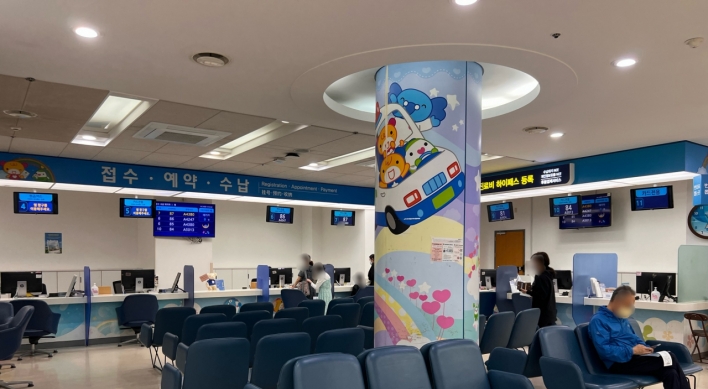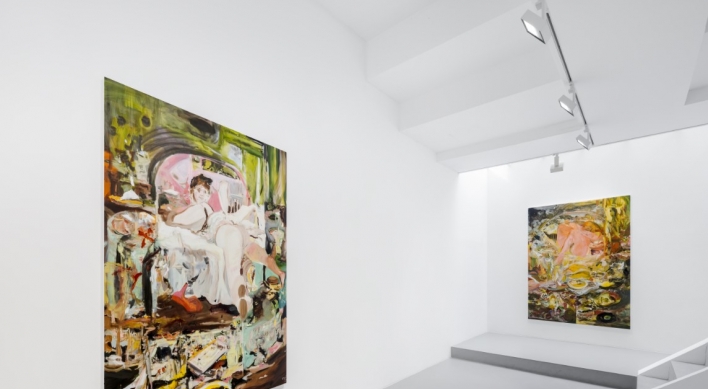Lee Ji-sun managed to sell off her small apartment in southern Seoul last month amid rising concern that a prolonged economic slowdown could send home prices into a downward spiral down the road.
The price of the 73-square-meter apartment rose to its record high of 600 million won ($530,000) in late 2009, but it tumbled to 450 million won in August, a steep decline that analysts blamed on a litany of economic woes.
“I sold my apartment out of fear that its price could drop further,” the 40-year-old golf teaching professional said. “I will not buy an apartment anytime soon.”
Lee’s case is a grim reminder of one of South Korea’s economic bugbears: the flaccid housing market that has already dealt a heavy blow to the local construction industry and could pose a threat to the entire economy.
“A further fall in house prices could lead to reduced household consumption due to its psychological influence, which in turn could lower economic growth,” said Choi Un-sun, a strategist at LIG Investment & Securities Co.
The government forecast the economy to grow around 3 percent this year, though many worry the growth rate may fall into the 2 percent range. The weight of the construction sector accounted for 5.9 percent of the Korean economy in 2011, down from 8 percent in 2003, according to the Bank of Korea.
The property market slump has forced South Koreans to change their perception of buying a house. Once seen as a key investment option, it has become a financial liability, especially for mortgage holders.
“There’s nothing we can do but just watch those who got aboard the last bus suffer,” Finance Minister Bahk Jae-wan told lawmakers on Monday, referring to those who bought real estate in recent years. He described the current slump in the real estate market as a painful process of a price bubble bursting.
Many Koreans have borrowed money from banks to buy apartments in recent decades on apparent expectations that they can make huge profits.
According to recent government data, outstanding household loans reached 455.4 trillion won ($403 billion) in July, up 700 billion from June, a level analysts fear could pose a potential risk for the banking sector and the economy as a whole.
Macquarie Equities Research said in a report in July that 60 percent of household loans are property-related and households are being forced to deleverage further amid a lackluster property market.
Apartment prices in Seoul, the capital, jumped 367 percent between 1986 and 2011, according to data compiled by South Korea’s top lender Kookmin Bank.
The price surge fueled a construction boom and boosted the local housing market before the 2008 global financial crisis and the eurozone debt crisis began to pull down housing prices.
“People do not hurry to buy houses as there are concerns that housing prices could further fall,” said Lee Kyung-ja, a construction analyst at Korea Investment Securities.
Homeowners’ wait-and-see attitude, she explained, has led to piles of unsold apartments, further dragging down profits of local construction companies.
The number of unsold apartments and houses stood at 67,060 as of July, up from 31,512 in December 2001, according to the Ministry of Land, Transport and Maritime Affairs.
Ryu Jin, a 39-year-old who works for a foreign firm in Yeouido, South Korea’s equivalent to New York’s Wall Street, also said he will not buy a house anytime soon because he cannot be sure whether the housing market has hit bottom.
“I believe there is still room for housing prices to further drop,” Ryu said.
The average price of apartments in Seoul fell 0.46 percent in August from July, the 18th straight monthly drop since March 2011, when the average price for one square meter stood at 17.94 million won (US$15,870), according to data compiled by Real Estate 114, a real estate information provider affiliated with South Korea’s Mirae Asset Financial Group Co.
The wait-and-see attitude appears to be gaining ground in South Korea amid an economic slump, calling into question a long-held view that people must own a home.
“Owning a house is a headache, not an investment,” said Lee, the golf teaching professional.
Park Won-gap, the senior head of real estate business at Kookmin Bank, said the largest factor of the housing slump is people’s fear that they can lose money if they buy real estate these days.
“The housing market could recover if there is a signal that home prices could go up,” Park said. “Still, it’s unlikely to turn around the big trend of a decline in the real estate market.”
Bahk, the finance minister, also echoed the concern, saying any government measures are unlikely to reverse the situation.
However, Choi, the strategist at LIG Investment & Securities Co., said he expects housing prices could bottom out in either the third or fourth quarter of this year as the economy could begin recovering next year, citing the business cycle.
Weakening demand for houses, coupled with falling housing prices, has dealt a heavy blow to local construction firms grappling with dwindling orders and piles of unsold houses.
“The local construction market is in trouble,” said Seo Byung-woon, senior vice president in charge of public relations at Daewoo Engineering & Construction Co., one of South Korea’s leading builders.
Seo said Daewoo and other builders are seeking to bag overseas deals due to declining demand for housing and social infrastructure in South Korea.
South Korean builders have won overseas orders worth more than $500 billion over the past decades, according to government data.
Still, some builders have clinched lower-priced deals due to heated competition among South Korean companies, a practice that squeezes their margins.
(Yonhap News)
The price of the 73-square-meter apartment rose to its record high of 600 million won ($530,000) in late 2009, but it tumbled to 450 million won in August, a steep decline that analysts blamed on a litany of economic woes.
“I sold my apartment out of fear that its price could drop further,” the 40-year-old golf teaching professional said. “I will not buy an apartment anytime soon.”
Lee’s case is a grim reminder of one of South Korea’s economic bugbears: the flaccid housing market that has already dealt a heavy blow to the local construction industry and could pose a threat to the entire economy.
“A further fall in house prices could lead to reduced household consumption due to its psychological influence, which in turn could lower economic growth,” said Choi Un-sun, a strategist at LIG Investment & Securities Co.
The government forecast the economy to grow around 3 percent this year, though many worry the growth rate may fall into the 2 percent range. The weight of the construction sector accounted for 5.9 percent of the Korean economy in 2011, down from 8 percent in 2003, according to the Bank of Korea.
The property market slump has forced South Koreans to change their perception of buying a house. Once seen as a key investment option, it has become a financial liability, especially for mortgage holders.
“There’s nothing we can do but just watch those who got aboard the last bus suffer,” Finance Minister Bahk Jae-wan told lawmakers on Monday, referring to those who bought real estate in recent years. He described the current slump in the real estate market as a painful process of a price bubble bursting.
Many Koreans have borrowed money from banks to buy apartments in recent decades on apparent expectations that they can make huge profits.
According to recent government data, outstanding household loans reached 455.4 trillion won ($403 billion) in July, up 700 billion from June, a level analysts fear could pose a potential risk for the banking sector and the economy as a whole.
Macquarie Equities Research said in a report in July that 60 percent of household loans are property-related and households are being forced to deleverage further amid a lackluster property market.
Apartment prices in Seoul, the capital, jumped 367 percent between 1986 and 2011, according to data compiled by South Korea’s top lender Kookmin Bank.
The price surge fueled a construction boom and boosted the local housing market before the 2008 global financial crisis and the eurozone debt crisis began to pull down housing prices.
“People do not hurry to buy houses as there are concerns that housing prices could further fall,” said Lee Kyung-ja, a construction analyst at Korea Investment Securities.
Homeowners’ wait-and-see attitude, she explained, has led to piles of unsold apartments, further dragging down profits of local construction companies.
The number of unsold apartments and houses stood at 67,060 as of July, up from 31,512 in December 2001, according to the Ministry of Land, Transport and Maritime Affairs.
Ryu Jin, a 39-year-old who works for a foreign firm in Yeouido, South Korea’s equivalent to New York’s Wall Street, also said he will not buy a house anytime soon because he cannot be sure whether the housing market has hit bottom.
“I believe there is still room for housing prices to further drop,” Ryu said.
The average price of apartments in Seoul fell 0.46 percent in August from July, the 18th straight monthly drop since March 2011, when the average price for one square meter stood at 17.94 million won (US$15,870), according to data compiled by Real Estate 114, a real estate information provider affiliated with South Korea’s Mirae Asset Financial Group Co.
The wait-and-see attitude appears to be gaining ground in South Korea amid an economic slump, calling into question a long-held view that people must own a home.
“Owning a house is a headache, not an investment,” said Lee, the golf teaching professional.
Park Won-gap, the senior head of real estate business at Kookmin Bank, said the largest factor of the housing slump is people’s fear that they can lose money if they buy real estate these days.
“The housing market could recover if there is a signal that home prices could go up,” Park said. “Still, it’s unlikely to turn around the big trend of a decline in the real estate market.”
Bahk, the finance minister, also echoed the concern, saying any government measures are unlikely to reverse the situation.
However, Choi, the strategist at LIG Investment & Securities Co., said he expects housing prices could bottom out in either the third or fourth quarter of this year as the economy could begin recovering next year, citing the business cycle.
Weakening demand for houses, coupled with falling housing prices, has dealt a heavy blow to local construction firms grappling with dwindling orders and piles of unsold houses.
“The local construction market is in trouble,” said Seo Byung-woon, senior vice president in charge of public relations at Daewoo Engineering & Construction Co., one of South Korea’s leading builders.
Seo said Daewoo and other builders are seeking to bag overseas deals due to declining demand for housing and social infrastructure in South Korea.
South Korean builders have won overseas orders worth more than $500 billion over the past decades, according to government data.
Still, some builders have clinched lower-priced deals due to heated competition among South Korean companies, a practice that squeezes their margins.
(Yonhap News)
-
Articles by Korea Herald




![[Grace Kao] Hybe vs. Ador: Inspiration, imitation and plagiarism](http://res.heraldm.com/phpwas/restmb_idxmake.php?idx=644&simg=/content/image/2024/04/28/20240428050220_0.jpg&u=)

![[Herald Interview] Mom’s Touch seeks to replicate success in Japan](http://res.heraldm.com/phpwas/restmb_idxmake.php?idx=644&simg=/content/image/2024/04/29/20240429050568_0.jpg&u=)


![[News Focus] Lee tells Yoon that he has governed without political dialogue](http://res.heraldm.com/phpwas/restmb_idxmake.php?idx=644&simg=/content/image/2024/04/29/20240429050696_0.jpg&u=20240429210658)









![[Today’s K-pop] Seventeen sets sales record with best-of album](http://res.heraldm.com/phpwas/restmb_idxmake.php?idx=642&simg=/content/image/2024/04/30/20240430050818_0.jpg&u=)